乌镇时代 | Wuzhen times
The first World Internet Conference was held November 19-21, in the scenic water village of Wuzhen (proudly endorsed by 7,000 years of history). English-language tech bloggers and news outlets were mostly outraged at and/or dismissive of the event: how dares China host a World Internet Conference while also censoring content, blocking websites and curtailing freedom of expression!? Don’t they have a face? And anyway, nobody will show up because Western tech companies support liberalism and democratic values – another case of wishful Chinese thinking closed. But was this the case?
Many Chinese Internet researchers would agree it wasn’t, and would also argue that the organization and the framing of the event weren’t unexpected moves: Chinese authorities have been pushing on the rhetoric of nationalizing Internet governance for quite a while, and with recent reshuffles in the administration – as Xi Jinping has set up a State Internet Information Office more independent from the SARFT, and sits in a working group on Internet security – have clearly moved towards a centralization of the oversight of the Internet. This post is just an attempt at playing around with some snippets of Chinese-Internet-related news from the last three weeks, trying to see if common trends emerge from the post-Wuzhen, and how they relate to more dated (but by no means less relevant) scholarship. If you’re interested in more regular and updated digests, you’re welcome to follow the Chinese Internet Research Network (CIRNet) Twitter account:
A 2001 article by Nina Hachigian titled China’s cyber-strategy is a very interesting starting point: thirteen years ago, policy-making was still pretty adamant about the ineluctable march of technology. As Hachigian argues:
“In the near term, the Internet’s effects will not threaten the CCP’s power because the party’s management tactics are effective, because only a small proportion of the population is on-line, and because few care to challenge the ruling regime during the present period of economic and political stability. But perhaps five years hence, when one in ten Chinese citizens will have Internet access and virtually everyone will know someone with an account, the shift in information control and communication will have the potential to undermine CCP rule. Exposure to new ideas, new perspectives on government actions, and events in China will have grown. Economic independence from the state will have increased. Connections between citizens will have multiplied. A political or economic crisis in this wired China of the future would unfold differently than it would today” (p. 118)
Enter Wuzhen, and almost one in two Chinese citizens have Internet access, more and more people are exposed to new ideas and perspectives on local, national and international events, economic independence has increased, social connections have multiplied… thirteen, not five years have passed, but the crisis hasn’t arrived, the party’s management tactics are still quite effective, and actually the ‘wired China of the future’ is already making moves to push its own idea of Internet governance: one based on national sovereignty.
At the helm of this “farcical” and “ridiculous” endeavor is Mr. Lu Wei (鲁炜), catapulted under the spotlight of Western media after a career in Guangxi’s branch of Xinhua News and a stint as vice-major of Beijing as soon as he got promoted as Chairman of the SIIO. Indeed, he seems to have a sense of humor, since he reportedly proclaimed that: “Our censorship of NYTimes in China is just like how you can’t get People’s Daily everywhere in America.” This comment, verging on absurdist satire, is a poignant example of how much the Chinese government’s position regarding ICTs has shifted, over the last ten years, from naive optimism to sardonic master cynicism: in 2004, writing enthusiastically about digital libraries, Huang Qunqing described the marvels of global access, and the contrast is striking:
“News online is free. Users can read Guangzhou Daily in the USA or read the New York Times in Guangzhou city without limits of cost, region or politics. Many young ‘netizens’ prefer the Internet editions of newspapers to the printed editions, because they can read the news online before their work or during their work-break” (p. 182)
Even though Lu Wei’s reported claim might be an off-hand jest – I’m pretty sure Mr. Lu knows the difference between print and digital media – a constellation of news stories from the past weeks might trace a similar shift in policy and negotiations parallel to the recent SIIO moves. The most discussed has probably been the news of China banning puns which, on a closer reading, is revealed to consist in a directive aimed at “radio and television authorities at all levels” to “tighten up their regulations and crack down on the irregular and inaccurate use of the Chinese language, especially the misuse of idioms” – quite a far cry from a Cultural Revolution-style crackdown on laughter. Let’s remember that already four years ago, as chronicled by Gong & Yang (2010) in their case study of Hu Ge’s The Bloody Case of a Steamed Bun viral video:
“Bothered by the increasing numbers of egao clips, the State Administration for Radio, Film and Television (SARFT) planned to announce new regulations on online videos and required the authors of egao to apply for a permit. Guangming ribao (Guangming Daily) also organized a workshop, invited experts from the media and universities, and discussed how to prevent egao. The participants analyzed egao from the perspectives of morality, law, and culture, and called for a stop to the egao trend.” (p. 23)
From steamed buns to steamy puns, opaque directives aimed at expunging neologisms, humorous homophones, acronyms and idioms from the language of news media are perfectly in line with the continuous attempts at linguistic normalization and cultural sanitization well summarized in point eight of the draft declaration slipped at midnight under the doors of guests in Wuzhen:
“Eighth, dedicate to the healthy growth of young people. We should strengthen the protection of minors online, crack down on the spread of pornography and violence, and make sure that the Internet does not damage the future of mankind.”
Anything new? Definitely not. The 2003 “Interim Regulations on the Management of Internet Culture” (a curious title indeed) already warn about the illicit dissemination of:
6. contents that spread rumors, disturb social order, and undermine social stability; 7. contents that promote lewdness, gambling, and violence or that abet criminality; 8. contents that insult or slander others or infringe on the legitimate rights and interests of others; 9. contents that harm public morality or the nation’s excellent cultural traditions;
Indeed, it could be argued that these reactionary regulations and recurring crackdowns on the lively repertoire of Internet users’ vernacular creativity in favor of “the nation’s excellent traditions” (including a largely simplified and rationalized writing system, yeah…) are typical of authoritarian China, but an article on CNN warning parents on the hidden dangers of Internet acronyms adopts strikingly similar arguments for the healthy growth of young (American) people: some acronyms can be a shorthand for sex, drugs and alcohol! Experts say parents should be aware of acronyms and talk to their children about them!
We might start to sense a tinge of similar populisms behind the different proclaims, especially when they branch out in so many different domains: in Shanghai, a new regulation prohibits the “mixed use” of Chinese and English in advertisement; Xi Jinping, possibly sick of architectural egao, expresses his distaste for supermodernist starchitecture; SARFT announces that creative and cultural workers will go back to the countryside for a month a year to “get into the thick of life and be better in touch with the people”. Is there a pattern here? Is Xi the true heir to Mao, setting up the stage for a new Cultural Revolution to cleanse China of Rem Koolhas’ buildings and lexical jokes?

Grotesque supermodernism: architectural egao giving a more fertile role to renowned elements of Chinese urban skylines (shared on Weibo, collected on 打酱油 dǎ jiàngyóu)
Jens Damm (2007) warns against the usual knee-jerk reaction to the weekly dose of China news: after years of waiting for the democratizing effects of the Internet, “the focus of Western observers has now shifted toward the role of the government: every single action taken by the Chinese authorities is immediately interpreted as a ‘crackdown’ and as censorship: a ‘control discourse’ has emerged” (p. 278). In short, we might be appalled at the idea of regulations issued to prescribe the use of language on news media, but for Chinese citizens “this is not astonishing: they expect the government to censor all media” (p. 283, my italics), and we shouldn’t assume that authoritarianism is always displeasing.
It is around this concept of expectancy that Magnus Wilson (2009) lays down a provocative thesis. The discourse of Western tech and policy reporting on China, he argues, is still trapped by the assumption that at some point, the Chinese state will not be able to maintain both control and economic growth, and will have to choose between unrest or democratization: “Essentially, the argument is that the profit motive recognises no ideology and therefore the decentralised marketization of the Chinese economy makes control and censorship increasingly problematic.” Yet, this assumption works only if profit really recognises no ideology: Mark Zuckerberg giving a speech in Mandarin at Tsinghua University, sending off his Vice President to do the same stunt in Wuzhen, and finally hosting Lu Wei in the US while recommending copies of Xi Jinping’s book The Governance of China to his employees all point in a slightly different direction – capital and ideology finding (indeed unpleasant) ways to recognize each other.
Moreover, according to Wilson, the accommodations of a decentralizing economy engender a “fantasy deficit” that actually drives nationalist sentiments and the support for reactionary claims. In the context of a decade through which “several foreign Internet companies – from Yahoo! and MySpace to Google and Facebook – have attempted to enter this enormous market, riding on their success in other parts of the world” (Oh & Zhang, 2010, p. 227), a degree of control and protectionism might actually project a reassuring image of the state:
“for young upwardly moving Chinese, the most avid consumers of foreign media in China, it is not just comforting to know that authoritarian control is not so absolute to prevent one’s pursuit of enjoyment […] It is also that there is an additional sense of security in the fact that the authorities are still operative at both a symbolic and (potentially) a very real level against those who threaten to jeopardise China’s integration with the global economy.” (Wilson, 2009)
Highlighting how economic growth and a generalized decentralization are actually sustained by their own backfiring as nationalist sentiments and support to conservative symbolic performances is a seductive way of slashing open the vicious circle of determinisms. “The flip side of China’s quandary over the Internet is the United States’ fortune—because the Internet is a commercial vehicle, U.S. and other foreign businesses will push for its expansion in China without added incentives,” writes Hachigian in 2001 (p. 133, my italics); a decade later, local companies “leverage on their home advantage to instill a sense of national pride upon users, thereby influencing them to use domestic services” (Oh & Zhang, 2010, p. 229), and protectionist policies double as reassuring performances of legitimacy: “the Communist party has always been very alert to the importance of China’s ‘symbolic environment’ […] and the media has long been used by the party as a vehicle for ‘thought work’ by which it promotes ‘socialist spiritual civilization'”, so that “the cuts become a defence of the authorities’ own image as the guardians of China’s status in the eyes of the idealised foreign other” (Wilson, 2009).
Why forbidding puns if everyone keeps joking anyway? Why banning Facebook if 93 million Chinese users have VPNs? Why prohibiting English from advertisements if people study it in school? Governmental legitimacy, rhetoric expectancy, symbolic performance and national sovereignty can help making sense of the quirky carnival of Wuzhen.
And bets for the launch date of Facebook.cn are open.
References:
– Damm, J. (2007). The Internet and fragmentation of Chinese society. Critical Asian Studies, 39(2), 273–294.
– Gong, H., & Yang, X. (2010). Digitized parody: The politics of egao in contemporary China. China Information, 24(1), 3–26. doi:10.1177/0920203X09350249
– Hachigian, N. (2001). China’s cyber-strategy. Foreign Affairs, 80(2), 118–133.
– Huang, Q. (2004). Reading outside the library: How the Internet has affected reading in China. Information Development, 20(3), 182–188.
– Ministry of Culture. (2010). Interim regulations on the management of Internet culture. Chinese Law & Government, 43(5), 83–91.
– Oh, L.-B., & Zhang, Y. (2010). Understanding Chinese users’ preference for domestic over foreign Internet services. Journal of International Consumer Marketing, 22(3), 227–243.
– Wilson, M. (2009). Transgressive conformity: DVD and downloading in China. International Journal of Žižek Studies, 3(1).
Chinese queries | 百度一下
屌丝一个: “Seriously speaking, is 100 wan enough to get out of China?”
飞飞: “You Baidu yixia first, see which country is a bit more reliable”

Failed suggestion for the search query 班长到底怀了谁的孩子 – Did you mean ‘sport commissary’?
This post is a companion piece to a discussion going on during the last weeks over the Chinese Internet Research Network mailing list (subscriptions welcome), stimulated by fellow OII researcher Han-teng Liao’s idea of exploiting the Baidu autocomplete function as a tool to “gauge the curiosity of users”. The questions discussed were the following: given that our Internet use is largely channeled by search engines, and given that most of search boxes feature some form of autocomplete or query suggestions, what can we social scientists make out of this sort of digital object? Can suggested queries be exploited ‘as they are’ to collect sets of data about search preferences and quantitative trends? Can they be tapped for samples to be used in cross-national comparative analyses? How should we approach these media artifacts?
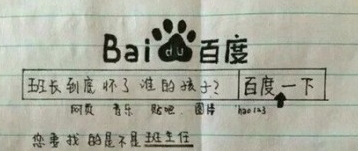
Hand drawing of the incongruous Baidu query suggestion 班长到底怀了谁的孩子, shared online, collected on 打酱油 dǎ jiàngyóu
My first answer to these questions is a general warning regarding the necessity to demystify the transparency of the autocomplete function and of query suggestions, reminding ourselves that search engines are ultimately corporate black boxes driven by algorithmic adjustments and daily fine-tuning that we researchers have very little insight into. Scholars in critical media studies have been exposing the workings of our Society of the Query for quite a while, and Min Jiang has recently published a paper on the specific case of China, comparing the concentration of search results on Google, Baidu and Jike. Paradoxically, the accumulation of partial insights without access to a transparent and complete overview of how a specific search engines aggregate and prioritize results complicates the work of researchers: we discover that suggestions don’t simply depend on a mean average of global searches, but are influenced by language, geography, search history, results rankings, chronological freshness, content filtering, legal cases, controversies, corporate choices, advertisement and so on. And even with the tools we can code, or thanks to the helping hand of digital methods, what we can do at most is often just obtaining some degree of automation and consistency for what would otherwise be a drudging and complicated routine of data collection, while what happens behind the search box remains a matter of speculation.

Collettivo Carmine, “Query Oraculum” (2013) – “when will”, 12-frame animated .GIF image (495x282px)
Despite these uncertainties, search engines’ query boxes have often been not-so-strange attractors for academic research and artistic practice. The work of Pascal Jürgens in reassessing the real impact of filter bubbles, for example, shows that digital methods can be deployed in the social sciences with a certain degree of validity and help answering specific research questions. Collettivo Carmine’s 2013 artwork Query Oraculum, to which I contributed, condenses a year-long sampling of the suggestions triggered by four English-language existential questions into looping .GIF images, visualizing the temporal changes of the ranking and the influence of news events and technological recurrences (“when will windows 8 be released?”; “when will facebook timeline be mandatory?”). Similarly, the delightful GooglePoetics gives quadruplets of autocompleted results a literary edge by framing them as postdigital haiku of everyday knowledge.

GooglePoetics autocomplete haiku, June 1st 2014
Yet, as Hanteng notes, this line of work is a purely descriptive or at most interpretive one, and still relies on arbitrary choices of sampling. His proposal is instead to build onto the concept of black box as theorized by cybernetics and control theory, and to find ways to hijack search engines by rerouting their inputs and outputs: “even if the search engine companies prevent us from knowing the inner working of the black box, we can still *steer* the outcomes by creatively and systematically feeding the new inputs based on what we know from the outputs.” What Hanteng is proposing here is in line with hijacking practices like Google bombing favored by digital media activists and Search Engine Optimization professionals alike.
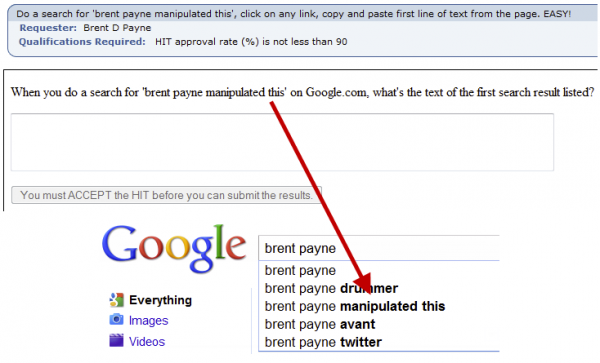
Brent Payne demonstrating Google autocomplete manipulation through Amazon’s Mechanical Turk
It’s a fascinating technical domain, yet it clearly falls in the category of action research and would require extensive work on the ethics of manipulating search engine results. In fact, Google and most other search engines are constantly engaged in fighting query bombings, SEO strategies, spam and exploits, potentially rendering years of interventionist research useless with one simple algorithmic fix. A sad example of this is Steve Kemple’s 2011 piece “i don’t know” OR “i dont know”, which used “a simple Boolean query to bring form to collective uncertainty then allowing it to disperse once more into the cloud”: after Google fixed the exploit upon which the piece was built, the artwork’s URL now results in a page vaguely (and ironically) stating “Your client has issued a malformed or illegal request. That’s all we know.”

Original output of Steve Kemple’s “i don’t know” OR “i dont know” (2011)
My second answer is a more constructive and qualitative one: to be able to say anything about search engines and their functions, one should inquire about how people use them. Without a deep insight into the shifting levels of trust that users put on search engines, into the biases that the feel they have to compensate for, into the social semantics of querying, and into the actual efficacy of query suggestions to influence usage or sway users, cracking the black box of autocomplete by tinkering with its inputs and outputs may have little sociological relevance. This is especially crucial in the context of nationalizing Internet governance and local digital cultures that shape the approach to search engines while also feeding back into their results. Simply assuming that “users may feel frustrated or even powerless when they encounter machines/systems such as search engines” seems to fall into the enlightened false consciousness mode of social scientists seeing power everywhere.

Screenshot of 最好的 (‘the best’) query on Baidu, shared on QQ as a funny image, collected on 打酱油 dǎ jiàngyóu
During my fieldwork, I’ve experienced the sudden blockage of Google Search in China on June 4th 2014, and listened to different people detailing their relationship with search engines on often humorous terms – complaining about Google’s censorship, ridiculing Baidu’s limitations, or discussing VPNs. The proliferation of humor about search engines shows how these digital artifacts are in fact already included in everyday life as elements of our postdigital cultures: users might not be waiting for critical media scholars to figure out the epistemological implications of suggested queries, and to express them in humor and popular wisdom. In fact, Baidu will have a lot of work to do to dispel its negative image of ‘search engine with Chinese characteristics’ and to rebuild a form of trust: as one of my interviewees put it, “the education, the Chinese education, it never tells you to search for the truth, to find the truth, to confront sources, to not only use Baidu for your searches…”
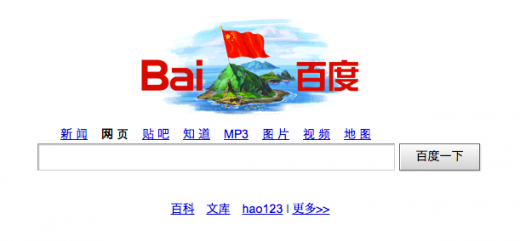
Baidu’s Diaoyu Islands doodle, September 2012
As a specific example of how qualitative insight might help direction research on search engines, I will highlight some very superficial impressions gathered from Hanteng’s initial scraping. The first batch of Baidu autocomplete results he posted on his blog were elicited by a query pairing the word “why” (为什么) with a geographical descriptor. The result, as expected, seems to be a repertoire of national stereotypes and intercultural curiosities: 为什么日本人叫中国人支那人 (‘Why do Japanese people call Chinese people zhina ren?’), 为什么美国人喜欢把钱卷起来 (‘Why do Americans like to roll up banknotes?’), 为什么香港人讨厌大陆人 (‘Why do Hong Kong People dislike Mainland People?’) or 为什么大陆不能上facebook (‘Why can’t the Mainland use Facebook?’). Yet, these questions are for the most part quite specific and link towards issues that could be explored in more qualitative ways: Internet governance (the blockage of Facebook), the politics of translation (the Japanese term zhina ren), media representation (wads of dollars in American movies), and local tensions (unwelcoming Hongkongers).
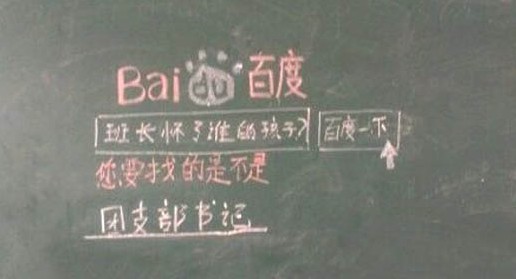
Blackboard sketch of the incongruous Baidu query suggestion 班长到底怀了谁的孩子, shared online, collected on 打酱油 dǎ jiàngyóu
An even more striking example of how digital cultures natively hijack results rankings is highlighted by the first suggested result of the general “Why” query, as reported by Hanteng in his second post: 为什么我有了奥特曼变身器 (unfortunately translated through Google Translate as ‘Why do I have turned control Altman’) is actually a catchphrase that has become popular after someone posted on Baidu the question ‘Why do I have Ultraman’s transformation item yet I still can’t transform?’, originating scores of funny responses. As a user on the Tiexue forum recounts:
“haha, I am laughing to death, today I was searching stuff on Baidu, and as soon as I input ‘Why’ it immediately results in this ‘Why do I have Ultraman’s transformation item yet I still can’t transform?’… when I read it through I laughed my ass off”
“哈哈,笑死我了 ,今天在百度上搜东西,输入为什么,就出来了这个“为什么我有了奥特曼变身器仍然不能变身” 看完我笑喷了”

Screenshot of the original Baidu question “Why do I have Ultraman’s transformation item yet I still can’t transform?”, posted on the Tiexue BBS
Users have noticed, and laughed off, and traced back, and joked about, the incongruity of the first suggested Baidu result for the common query “Why”, just as they have done about 班长到底怀了谁的孩子 (‘in the end, the class representative is bearing whose child?’), the first result which at some point Baidu suggested for the term 班长 (‘class representative’). Are these series of jokes a sort of search engine folklore? Urban legends of the query? Autocomplete humor? As GooglePoetics notes, “Google writes poetry on subjects that people are truly interested in”: without a careful and culturally informed qualitative work, the very human background of this kind of machine-poetry written by search engines is bound to be inevitably lost in automated scrapes and translations.
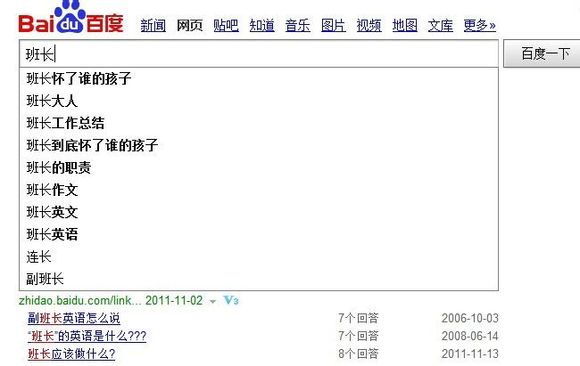
Original screenshot of the incongruous Baidu query suggestion 班长到底怀了谁的孩子 (‘in the end, the class representative is bearing whose child?’)
Anyway, my intention is not to turn the whole debate into a sterile iteration of the usual qualitative/quantitative scuffles, but rather to turn the edge of critical media theory against itself and propose ways of understanding search engines through their users before throwing ourselves in interventionist enterprises. Search engines collect and organize mind-boggling amounts of information, to the point of being able to track epidemics and organize relief actions after natural disasters. But they are also machines to extract profit from data, and their workings remain (necessarily?) obscure, definitely more algorithmically slippery than any feedbackable cybernetic black box. Turning a search engine into a self-cannibalizing mechanism seems hardly possible – Google Will Eat Itself in more than 200.000.000 years, according to recent forecasts – but surveying them from different perspectives and depths can only result in richer and more contextual understandings of our Societies of the Query.